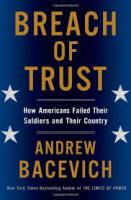Bacevich on the Betrayal of U.S. Soldiers
 Review of Andrew J. Bacevich, Breach of Trust: How Americans Failed Their Soldiers and Their Country. New York, Metropolitan Books, 2013. 238 pages. Endnotes. Hardcover $26. Paperback $16. Kindle $11.04
Review of Andrew J. Bacevich, Breach of Trust: How Americans Failed Their Soldiers and Their Country. New York, Metropolitan Books, 2013. 238 pages. Endnotes. Hardcover $26. Paperback $16. Kindle $11.04
Although Andrew Bacevich had already published by 2003 two major critiques of what he was comfortable referring to as “The American Empire,” it was in 2008 that he managed to distinguish himself still further. While supporting Barack Obama for president as a lesser evil to John McCain, whose expansionist polices he regarded as hopeless from his own, self-proclaimed conservative point of view, he took exception to Obama’s claim that the U.S. armed forces were too small. As Bacevich saw it, the problem was that the foreign policy was too large. Nothing has happened since to change his mind and Bacevich has emerged as one of the most vehement opponents of neoconservative, globalist foreign policies, whether put forward by Republicans or Democrats alike. While Madeleine Albright, the Clintons, and many others have identified the U.S. as the one “indispensible nation,” Bacevich has in effect cried out, stop this world, I want to get off.
Bacevich has regularly identified himself as a conservative, a Republican and even a believer in original sin as well as having had a long career in the military, having fought in Vietnam and the First Gulf War and retired at the rank of colonel (and having lost his son in the war in Iraq). Not the usual story of someone to be put in a place of honor among the readers of New Politics. But don’t let any of his personal details put you off, go and read the books and catch him on TV and YouTube.
A major issue for Bacevich is the elimination of the draft, which he calls “Dick’s Trick.” [A]lthough Nixon had run for the presidency, vowing to end the Vietnam War, eliminating the draft permitted him instead to prolong it.” Furthermore, Bacevich argues that it caused the antiwar movement to lose steam and ultimately to induce public apathy toward war, creating in his view a form of “civic decay.” “The conversion of military service from collective obligation to personal preference [became] irrevocable.” Although there have been calls for a broadly constructed “national service,” from which the military would be drawn, sometimes even from liberals, this part of Bacevich’s inclination is sure to stimulate a great deal of debate.
Since the end of the Cold War there has not been the “peace dividend” that some had hoped for, but instead the advocates of the extension of American power have been “searching for dragons to slay.” Iraq became the poster child for the new category of “rogue states.” Where formerly the byword was containment, viewed as a negative aim, it was now to be replaced by a positive aim, “to promote democracy, regionally stability, and economic prosperity,” as one of the acolytes of the projection of American power promised. Consequently the slogan to “support our troops” becomes dominant and the public is discouraged from asking what purpose the troops might actually be serving and encouraged to remain passive.
After the conclusion of the Cold War the ideological foundation for globalism was momentarily absent but it came roaring back after 9/11 with the focus on terrorism, Islamism, or some variation thereof. America “is still out there doing God’s work.” Despite the denials that the U.S. is functionally an empire, Bacevich sees “global leadership” as an attempt to emulate such efforts as those in past years of Rome or Great Britain, merely hiding behind the cover of being Albrght’s indispensible nation or Hillary Clinton’s already announced desire to restore the U.S. to its proper leadership role in the world.
Bacevich seizes upon General George Marshall as the kind of leader to bring the country back to limiting its military to what is sufficient to protect itself and “its most important interests.” But there’s the rub, because it’s not that hard to transform this into the quest for “national security” which is already built into the name of its leading practitioner, the NSA. Thus the enshrinement of preventive war or a “kill list” that allows the president to order the long distance assassination of purported enemies of the U.S., even including its own citizens. The net result of all of this is that: “A people once profoundly suspicious of militarism tacitly embrace military power as a central element of national identity.” He argues that both neoliberals and neoconservatives are “committed to maintaining world-dominant military capabilities.”
Bacevich quotes historian Charles Beard in 1939 that “America is not to be Rome or Britain,” and comments that this has a quaint sound to it. “Global leadership” is exactly what the power advocates aspire to and what the notion of American exceptionalism has brought us to. “Support our troops” as a dominant slogan helps maintain a level of public passivity that can most likely bring us to rack and ruin. In his series of related books Bacevich has issued a clarion call for the American people to get involved and reject the dominant strain of foreign policy before it is too late. It is important that there are conservatives speaking out along with the left.
Jack Stuart is retired from teaching at Cal State Long Beach and lives in Minneapolis.